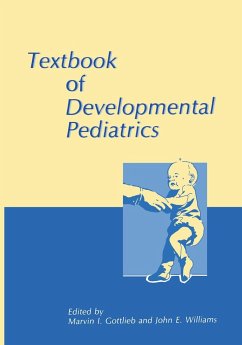
Textbook of Developmental Pediatrics

PAYBACK Punkte
20 °P sammeln!
Child/adolescent development and behavior have been a traditional "concern" of prima ry health care providers. However, it was not until the mid-1960s that attempts were made to consolidate developmental-behavioral issues into an identifiably distinct fund of medi cal knowledge. During the ensuing two decades, developmental-behavioral pediatrics was recognized as a clinical and research subspecialty, within the framework of compre hensive health care for children. The influence of public advocacy groups, topic-dedicated journals, national professional specialty societies, subject-related conti...
Child/adolescent development and behavior have been a traditional "concern" of prima ry health care providers. However, it was not until the mid-1960s that attempts were made to consolidate developmental-behavioral issues into an identifiably distinct fund of medi cal knowledge. During the ensuing two decades, developmental-behavioral pediatrics was recognized as a clinical and research subspecialty, within the framework of compre hensive health care for children. The influence of public advocacy groups, topic-dedicated journals, national professional specialty societies, subject-related continuing education programs, and federal legislation (PL94-142) has served to crystallize developmen tal-behavioral pediatrics as a specialized field of study. As a consequence, during the past ten years significant modifications have restructured medical student and pediatric resi dent education, providing an emphasis on developmental-behavioral issues. The focus on neurodevelopmental, educational, and psychosocial issues reflects changing priorities in traditional health care for children. The postgraduate training of pediatric fellows, in two and three-year training programs, was initiated to accommodate professional manpower needs in both academic and practice settings. Many of the problems in childhood development and behavior frequently span the traditional areas of child neurology, child psychiatry, and general pediatrics. As a result there has been some confusion in demarcating professional responsibilities in diagnosis and management, as well as poorly defined terminology and classification schemas. With the birth of developmental pediatrics as a pediatric specialty, a more cohesive fund of knowledge has been accumulated and more meaningful strategies have beendesigned for prevention, diagnosis, and management.












